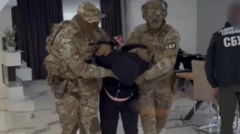The unfolding drama reveals a complex narrative of diplomacy, espionage, and political rivalry, showcasing how international relations can blur into national politics.
**Orban Under Fire: Accusations of Espionage and Political Maneuvering in Ukraine Relations**

**Orban Under Fire: Accusations of Espionage and Political Maneuvering in Ukraine Relations**
Viktor Orban faces backlash as espionage allegations escalate tensions between Hungary and Ukraine, fueling speculation over political survival.
In a significant diplomatic fallout, Hungary and Ukraine's already strained relations have reached a new low amid espionage allegations. Accusations directed at Viktor Orban's Fidesz government suggest that the Hungarian Prime Minister is leveraging tensions with Ukraine, particularly a recent spy scandal, as a strategy to bolster his diminishing political standing ahead of the 2026 elections.
This month, Ukraine's SBU security service arrested two citizens, charging them with spying for Hungary, claims supported by both video and audio evidence. The alleged spies are said to have ties to Hungarian military intelligence, allegedly preparing for military action within Ukraine's borders. In retaliation, Hungary expelled two Ukrainian diplomats, prompting a tit-for-tat response from Ukraine that has further soured bilateral relations.
Orban's stance as a prominent figure perceived as Russia's closest ally within the EU has drawn ire, particularly as his administration continues to break ranks with EU partners. Failing to support sanctions against Russia and characterizing Ukraine's pleas for EU membership as a mistake, critics argue that Orban's political maneuvers are driven by an agenda to suppress opposition, notably the rising Tisza party, which recent opinions polls suggest could unseat him.
A recent government initiative titled "Vox 2025," which sought the opinions of Hungarian households about Ukraine's EU aspirations, has sparked controversy, with Orban accused of using it as a focal point to rally nationalistic sentiments against Ukraine. Meanwhile, opposition leader Peter Magyar has emerged in public favor after providing humanitarian aid to a Ukrainian children's hospital shortly following a high-profile meeting between Orban and Russian President Putin that resulted in a deadly missile strike on Kyiv.
Roland Tseber, who assisted in delivering aid, has faced significant backlash from the Hungarian government, being labeled a "Ukrainian spy." Tseber, an independent politician, has publicly denounced these allegations, emphasizing his commitment to support his homeland. Yet, he finds himself banned from Hungary and the Schengen zone, as government elements intensify their scrutiny of Tisza-affiliated figures such as himself.
The fallout has wider implications for the Hungarian community in Ukraine, which has seen its population dwindle amid ongoing conflict. Allegations also target Romulusz Ruszin-Szendi, a former military chief and now Tisza party member, suggesting active engagement with Ukrainian intelligence in a bid to damage his standing within Hungary.
As Orban attempts to navigate a precarious political landscape marked by international conflicts and vibrant opposition, emerging recordings imply a disturbing shift: a leaked speech places Hungary not as a neutral player in the Ukraine conflict but veering towards a militarized stance—a shift that contradicts his earlier portrayal as a peace broker and raises questions about his governance and alliances amid growing tensions.
This month, Ukraine's SBU security service arrested two citizens, charging them with spying for Hungary, claims supported by both video and audio evidence. The alleged spies are said to have ties to Hungarian military intelligence, allegedly preparing for military action within Ukraine's borders. In retaliation, Hungary expelled two Ukrainian diplomats, prompting a tit-for-tat response from Ukraine that has further soured bilateral relations.
Orban's stance as a prominent figure perceived as Russia's closest ally within the EU has drawn ire, particularly as his administration continues to break ranks with EU partners. Failing to support sanctions against Russia and characterizing Ukraine's pleas for EU membership as a mistake, critics argue that Orban's political maneuvers are driven by an agenda to suppress opposition, notably the rising Tisza party, which recent opinions polls suggest could unseat him.
A recent government initiative titled "Vox 2025," which sought the opinions of Hungarian households about Ukraine's EU aspirations, has sparked controversy, with Orban accused of using it as a focal point to rally nationalistic sentiments against Ukraine. Meanwhile, opposition leader Peter Magyar has emerged in public favor after providing humanitarian aid to a Ukrainian children's hospital shortly following a high-profile meeting between Orban and Russian President Putin that resulted in a deadly missile strike on Kyiv.
Roland Tseber, who assisted in delivering aid, has faced significant backlash from the Hungarian government, being labeled a "Ukrainian spy." Tseber, an independent politician, has publicly denounced these allegations, emphasizing his commitment to support his homeland. Yet, he finds himself banned from Hungary and the Schengen zone, as government elements intensify their scrutiny of Tisza-affiliated figures such as himself.
The fallout has wider implications for the Hungarian community in Ukraine, which has seen its population dwindle amid ongoing conflict. Allegations also target Romulusz Ruszin-Szendi, a former military chief and now Tisza party member, suggesting active engagement with Ukrainian intelligence in a bid to damage his standing within Hungary.
As Orban attempts to navigate a precarious political landscape marked by international conflicts and vibrant opposition, emerging recordings imply a disturbing shift: a leaked speech places Hungary not as a neutral player in the Ukraine conflict but veering towards a militarized stance—a shift that contradicts his earlier portrayal as a peace broker and raises questions about his governance and alliances amid growing tensions.



















